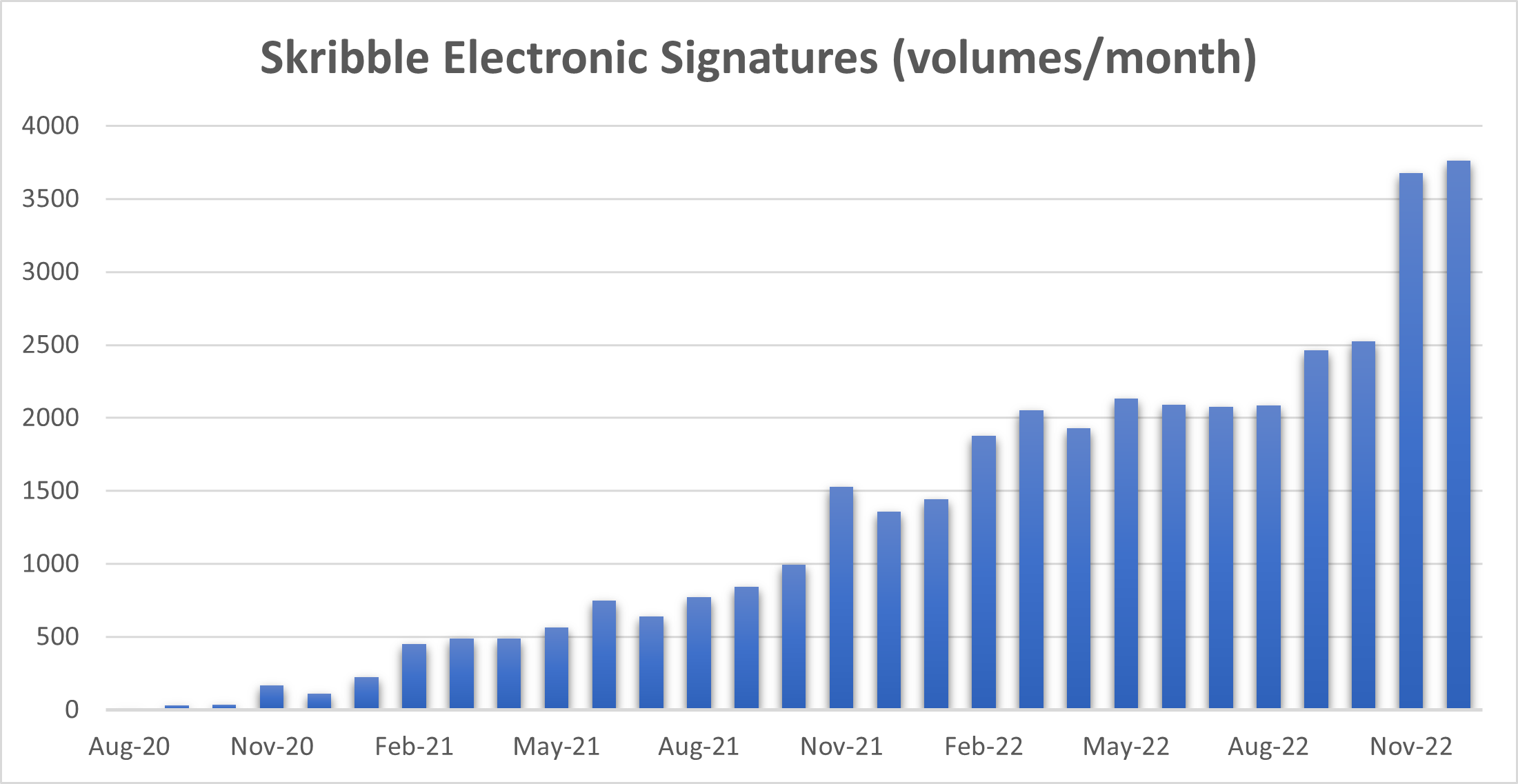From necessity to virtue: e-signing with Skribble is now standard at SBB

At Swiss Federal Railways AG (SBB), a measure that was initially implemented in August 2020 as an emergency solution during the pandemic has now become the norm in many divisions. Particularly in Infrastructure, whose employees are the most activ users of Skribble among SBB’s 3000+ Skribble users. SBB uses all three e-signature standards (SES, AES and QES) more than 3,500 times a month – and that figure is rising all the time.
Marcel Samstag, Epic Owner e-signing SBBSkribble is the Swiss army knife among e-signing providers: it has the right blade for every situation.
How SBB and Skribble came together
Kick-start for electronic signatures
In August 2020, the Covid-19 pandemic forced SBB to switch from pens to e-signatures. The main driver in this regard was the move to remote working.
SBB was looking for an e-signing solution that would allow:
- contracts that are required by law or internal guidelines to be signed in writing also to be signed digitally, i.e. it had to provide a qualified electronic signature (QES);
- teams to get started quickly;
- its high security standards to be met.
SBB opted for Skribble Business, the service for SMEs and teams, and began rolling it out straight away.
Exponential group-wide development
Skribble spread like wildfire throughout SBB – at a growth rate of 20% since its introduction in August 2020 – and quickly became established as the standard group-wide solution.
Marcel Samstag, Epic Owner e-signing SBBSkribble was a total self-starter. Without any promotion, its use spread throughout the Group according to the self-scaling principle.
Just over two years after the first team started using Skribble, more than 3,000 SBB employees from all business units and various teams are now e-signing with Skribble, with the result that SBB has already racked up more than 20,000 completed signatures. Currently, the whole SBB workforce combined e-signs more than 3,500 times a month with Skribble.
How Skribble is used
All e-signature standards covered
All three e-signature standards are used: qualified electronic signature (QES), advanced electronic signature (AES) and simple electronic signature (SES). Which standard is used and when depends on legal and internal requirements regarding the document to be signed.
Thierry Nkoutche, Skribble Angel SBBSkribble is a fast-to-implement, easy-to-use and scalable solution. It meets the signature standards required by Swiss (ZertES) and European (eIDAS) legal requirements on electronic signatures.
SBB is currently experiencing most growth in the use of QES. Qualified electronic signatures are permissible under both Swiss law (ZertES) and EU law (eIDAS), and are the clear preference under Swiss law.
Most active Skribblers in the infrastructure department
SBB Infrastructure currently holds the title of division with the most active Skribblers – due to the frequency of its dealings with authorities such as the Federal Office of Transport (BAV), which, in many cases, requires a QES.
Bruno Studer, SBB Infrastruktur, PGV Super UserWith the costs per file regularly running from hundreds to several thousands of francs, it also makes financial sense for SBB to switch to digital procedures and reduce the number of paper files.

A universal e-signing solution for all applications
The rapid spread and ever-increasing use of Skribble at SBB prompted the Group to adopt it as a standard, SBB-wide solution for electronic signatures. The fact that it covers all three e-signature standards was a decisive factor in SBB choosing the Skribble service. SBB employees also appreciate the fact that Skribble’s complete solution is so easy to use.
Marcel Samstag, Epic Owner e-signing SBBSBB recommends Skribble as a standard solution for all applications within the Group.
SBB also uses DocuSign alongside Skribble. DocuSign uses advanced electronic signatures (AESs) only and is currently limited to a select group of users, which is why the addition of Skribble is a universal SBB solution for all conceivable business transactions and user groups.
Other advantages of Skribble include:
- Universal legal validity: Valid for e-signatures under Swiss law (ESigA) and EU law (eIDAS).
- Most stringent security standards: Backed by a strong partner in Swisscom, hosted in Switzerland, GDPR-compliant, certified to ISO 9001 and ISO 27001.
- Integrable into existing systems: SBB has integrated Skribble into Microsoft applications such as OneDrive and SharePoint.
Stepping up: from Skribble Business to Skribble Enterprise
SBB is switching to Skribble Enterprise as of beginning of 2022, so, as well as being able to provide many more e-signatures, it will benefit from a host of Enterprise features, such as:
- Single sign-on (SSO): Automatic login in the background.
- Personalised support: A dedicated Customer Success Manager and priority access to technical support.
- Company branding: Own company logo on the signature platform.
Skribble quickly became group-wide standard solution. (Source: Skribble)
SBB x Skribble: Next steps
Support for further expansion
During the Covid-19 pandemic, the ability to work from anywhere was the main driver behind the switch to e-signatures. Now there is an increasing need for greater efficiency. The plan for the future is to integrate Skribble into selected workflows.
Marcel Samstag, Epic Owner e-signing SBBWe are now identifying and analysing specific use cases within SBB where there is high potential for adding value with electronic signatures.
Transfer to the regular operational organisation
Skribble’s introduction and use so far has been bottom-up. As part of the drive to establish it as a standard solution, Skribble will be transferred to the regular operational organisation and new emphasis will be placed on use-case development and consulting for digital business ‘e-signing’ capability.
About Marcel Samstag
Marcel Samstag, Skribble Product & Application Owner, Epic Owner (E-Signing), Senior Advisor (Digital Transformation & Strategy), fulfils several roles for SBB with the aim of designing, representing and advancing digital transformation in the organisation. One of Marcel’s main tasks at present is to embed digital business ‘electronic signature’ capability across SBB.
AboutSBB– Swiss Federal Railways AG
The company Swiss Federal RailwaysSBBis a joint stock company under special law with its registered office in Bern. Its public services include passenger services and rail infrastructure. It transports over 880,000 people and 185,000 tonnes of freight to their destinations every day. 33,900 employees are passionately committed to ensuring that their customers arrive safely, on time and in an environmentally friendly manner.


